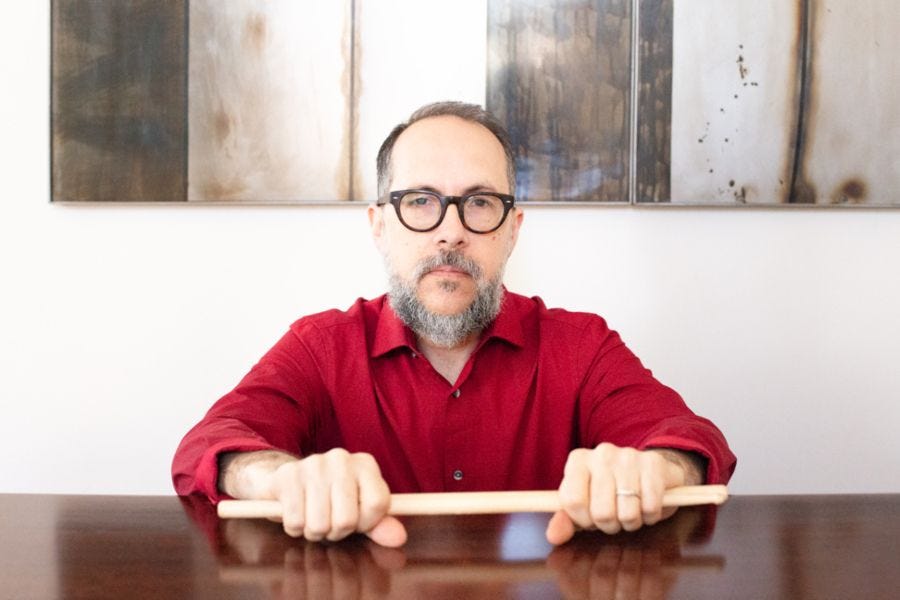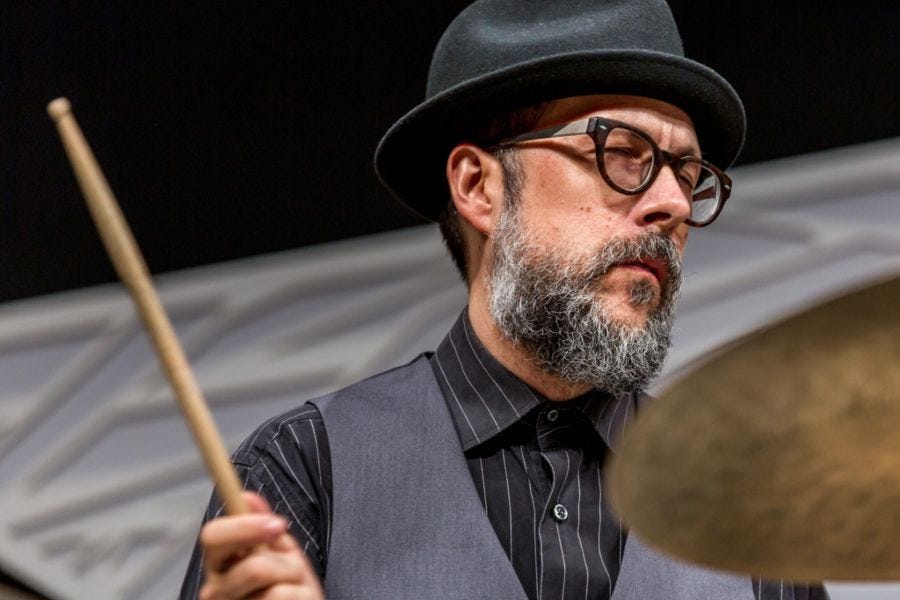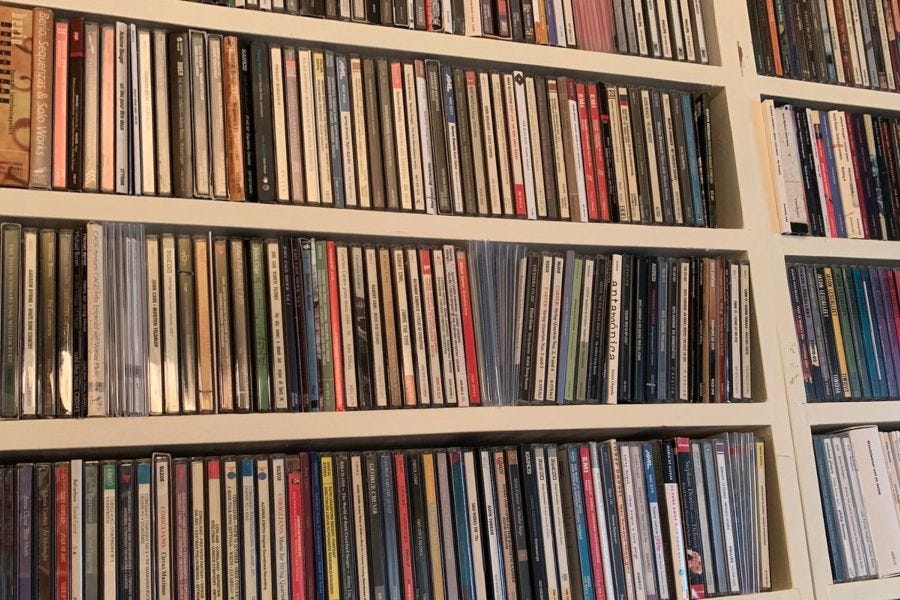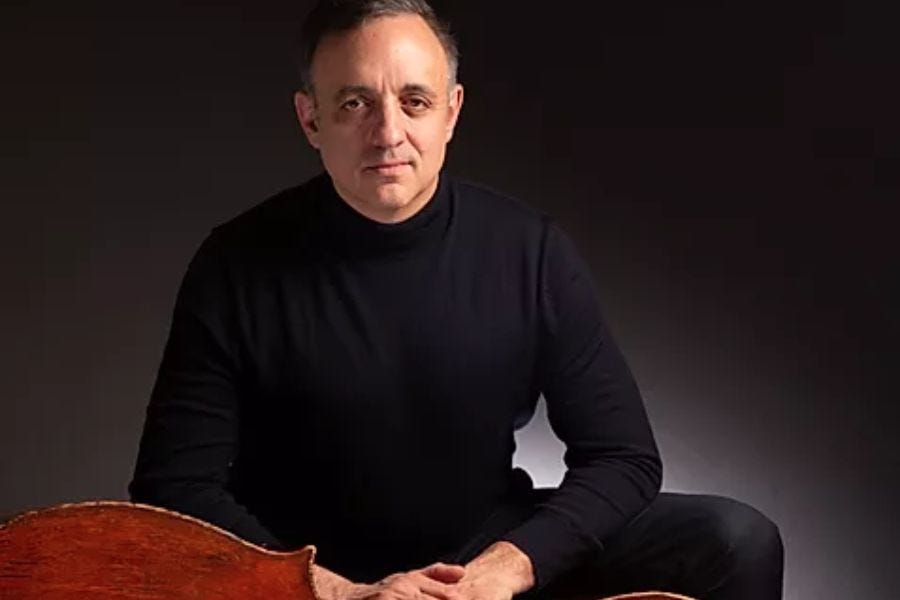Pure Imagination
Percussionist-composer John Hollenbeck talks about completing a substantial cycle, and the challenges of keeping music alive under present conditions. Plus, new and upcoming recordings of interest.
Don’t Give Up: An Interview with John Hollenbeck
Full disclosure: John Hollenbeck and I go back a long, long time, and not just as interviewer and subject. Around 20 years ago, when Composers Recordings Inc. – the venerable new-music imprint universally known as CRI – decided to diversify its offerings with a new line devoted to jazz and improvisation, I pitched in as an unofficial consultant to the label. Three of the five albums produced under the Blueshift banner were by Hollenbeck, a notable percussionist, composer, and arranger whose works straddled the barrier between jazz and contemporary classical music: no images, The Claudia Quintet, and Quartet Lucy. A fourth, Songs of Charles Ives, by Matt Moran’s Sideshow, featured Hollenbeck on drums. (I wrote liner notes for all four.)
And then, in April 2003, CRI shut down, its catalog folded into the archives of New World Records.
The experience stung, Hollenbeck admits. Even so, as he revealed last week during a lengthy Zoom chat, contacts he made and lessons he learned still apply to the projects he’s releasing now—which today, literally, happens to mean Songs You Like a Lot. The final installment of a beautifully quirky triptych devoted to reimagined pop songs, as performed by singers Kate McGarry and Theo Bleckmann, keyboardist Gary Versace, and the Frankfurt Radio Big Band, arrives today on Hollenbeck’s newly established non-profit label, Flexatonic.
Speaking from his home in Montréal, where he has taught at McGill University since 2015, Hollenbeck revealed what engaged him about arranging other people’s songs, why he decided to launch his own label, why he’s directing all label profits to Black Lives Matter initiatives, and how he’s keeping busy as a bandleader and collaborator – with longtime associate Meredith Monk, among others – during a time of enforced separation.
STEVE SMITH: We’re going to talk about your current project, as well as the bigger picture. But what I want to know first, and foremost, is how life during pandemic has been for you, in terms of creativity, inspiration, or whatever. I’d have to imagine that living outside of the United States probably has a serious bearing on how you’ll answer that question.
JOHN HOLLENBECK: I am on sabbatical this semester from my teaching job at McGill, and it kind of feels like the world joined me on my sabbatical. I was going to do a lot of gigs, and I was going to travel and stuff… I’ve already forgotten about all of that. [Laughs] Basically, I was okay with everything stopping—I mean, obviously I’m very, very lucky that I have a job, so I didn’t have to worry about that. I spent the first month mixing the new record, and then after that, I was able to get into the school here. So I would just walk to school every day, just practice, and ended up doing a lot of recording, some video things, some collaborations.
I got into this schedule where I was meditating in the morning, and then my wife and I would ride our bikes up the mountain in Montréal and exercise. I live simply. I don’t have kids and I don’t have a car. I’ve been exercising a lot more than I normally did. I’ve really been able to meditate every day, which is a hard practice for me to do on a daily basis, normally. And I’ve been practicing more than ever. For the last month I’ve been in Binghamton, New York. We just got back, so now we have to quarantine for two weeks.
I was going to ask you specifically about the experience of living outside of the U.S. but still having ties that bind.
Because I’m a resident here, it was possible for me to come back, whereas if I were a tourist, I wouldn’t be able to get into Canada. The healthcare system here is not perfect, but early on [during the outbreak] I was on my way to New York; I’m doing a duo project with Meredith Monk, and we were going to go to Big Ears to premiere it, and then when I was on my way to New York, Big Ears got canceled, so I ended up coming back here. We walked a block away, got a COVID test in five minutes, amazing and free. There are some benefits to being here.
How long have you been in Montréal, now?
Well, 2015 was kind of a bridge year. I was in Berlin from 2005 to 2015, and that year I did something stupid, teaching in both places at once. So, four years, really.
Is there any stronger semblance of a return to normalcy there than there is here?
It’s pretty similar. The Québec government controls most of that. The school put us on remote for the fall pretty early on; I think it was probably April. People were like, “wait, what?” But now it seems that was a good decision. They opened up the bars for a little while, but then they had an increase in cases. So not that much different. But the thing about Montréal is it’s a summer festival town; obviously the jazz festival is huge, and the comedy festival, a Francophone festival. And all of that was canceled.
At the very least, you have a beautiful new album to celebrate, and it’s the culmination of a thematic trilogy. Did you plan it that way?
I did not. It had a very humble beginning: I wanted to do a project with Kate McGarry and Theo Bleckmann together. I met Kate while working on Fred Hersch’s Leaves of Grass. Theo and Kate knew each other and loved each other, so I knew it would be great. And then Gary Versace, putting them together – everybody knew each other, and played together in their own groups – but to put it together as a feature with the Frankfurt Radio Big Band.
In the beginning, I didn’t title it. It might have been called “Modern Pop Songs,” or something like that. It was just an idea to take some pop songs—which then immediately I realized: I don’t know what that means. I had to figure that out. The first record [Songs I Like a Lot] ended up being what I thought pop songs were. In some cases, I think I was way off, or I came up with some unpopular pop songs – in the pop song genre, but not popular – and some stuff like “Wichita Lineman,” stuff I didn’t think I knew, but I totally knew.
To some extent, a song like “Wichita Lineman” you just absorb through osmosis, being anywhere in the United States at a certain time.
And I was just reading up, people are doing a lot more research about this certain time of your life, that whatever you hear, even if you hate it, you love it, and it’s always going to be a part of your life in some way.
I need to know more about that phenomenon. I feel like at whatever point in life that is, I must have been listening to Kansas.
Right, right. Why it happens has something to do with your brain growing at that certain time, really imprinting things. But I didn’t even think I listened to the radio when I was a kid, because I was like a snob, you know? That’s what’s kind of bizarre to me. The radio was going on. The radio was there all the time, in the car and in the home. My dad actually liked Glen Campbell, so I think it was there, too. There were some records and stuff.
So that was the first one. And then the second one… I’d asked Theo and Kate a little bit before, but for the second one I asked them a lot more: what songs do you want to do? So that was Songs We Like a Lot.
They both have a beautifully eclectic, slightly askew take on what constitutes a pop song, as well, so it felt like a kind of natural extension of your original vision.
Definitely. And what also happened for me was that I realized I didn’t have to like something to arrange it successfully. Like, I don’t know Queen at all, and Kate wanted to do “Bicycle Race.” I was like, okay, I’ve never heard of that tune, but sure. So during that project, I thought, okay, now we can do one more, and on this one, let’s have other people decide what we’ll do. So we put it on Facebook and had people make this huge list, and then cut it down to a low of 20.
At that point I thought about it some more: Kate and Theo have to sing this stuff, so they actually do kind of have to like it; it’s a little different than me. I gave them the list of 20, and it was pretty easy after that, because they just knocked 10 of them down: “I hate that song,” and “we shouldn’t do that one.” Some of the songs I knew, and some I can say I didn’t really love.
I’m dying to know which ones in this new batch you didn’t really like, but I won’t put you on the spot.
People can guess. But also, what happened with this record was just the practicality about it. I was teaching and doing other stuff, and it had to come together in a very short period of time—the shortest period of time I’ve ever had, where it was like, I have one day to write this arrangement. And you know what? At least one of those, I felt like I did it in one day. And I’m not fast, and I’m not trying to put together a stock arrangement, where I could just throw something together.
Because it had to come together in such a short period of time, I was able to let go of, “do I like this?” It’s just material, you know? So I was really able to get into the arranging part of it, and throughout the project discovered the depth of arranging. You just put a little twist on it, and because it’s different people singing and it’s a big band, it’s going to be kind of different. On the first record there’s a Imogen Heap song [“Canvas”], and that one was so beautifully written, I felt like I just orchestrated.
That’s kind of the least you can do, and then the most, probably, on the whole project is the Daft Punk song [“Get Lucky”] that I scrambled so much, maybe no one would even recognize it. That was because I saw the Russian Police Choir for the Olympics, you know? My idea for that piece was, here’s what I think it should have sounded like, because they just made it sound like the original, but it didn’t look right. So I did mine with an automated Russian voice. What I realized is that if I want to go really far, there can’t really be a vocalist, because they need to sing the words, and maybe the melody.
It’s been interesting to figure out what else is available to take apart. The Brian Wilson song on this album [“God Only Knows,” rendered as “Knows Only God”] is the first time I actually arranged the words, and I did that first. That was a pretty interesting process, to see if I arranged the words how it basically changed the meaning. And then from there, I put it back together again. If you know that song, I think you’ll hear it, but maybe not obviously right away.
For the entire time that we’ve known each other, I’ve known you as a very serious and dedicated composer. So, as a composer, what’s fascinating or illuminating about rearranging these pop songs? Do you get anything out of this process that you then take back to your own original work?
Essentially it’s not different, because you start with something and then you work on it. I take something that I call a cell, and then I manipulate it in so many ways, so it sounds different, but it’s the same thing. So with arranging, maybe the difference is that the cell does not come from me, and it’s established. It’s successful.
If you’re working on a cell of your own, as you’re working on it you’re trying to figure out: is this good? Does it have structural integrity? Does it have depth? But with a piece like “Fire and Rain,” it’s a very successful piece. You know that already. There’s something about that collection of words and pitches that works, so you don’t want to mess that up. I don’t want to say it’s easier, but you’ve got a head start, because you didn’t have to come up with the generative material.
On the other side, with a composition no one’s going to say, “no, that’s not it, you’ve ruined the original,” because they’ve never heard the original. You can go as far as you want with a composition, whereas with an arrangement you do want people to recognize the melody or the words. And in cases where I went away from that, usually I had to take out the vocals.
There was a Kraftwerk song I originally did, maybe for the first album, but it ended up on my last Large Ensemble record. It was a song Theo wanted me to do, so I think I disappointed him with it. But I realized that to get to where I wanted to go with it, I had to take out the vocal and the words. Just keeping the melody, I could create this other arrangement.
This is your version of “The Model” on All Can Work.
Right. The UMO Jazz Orchestra from Finland just did a coronavirus video version of it… it seems like a year ago, but it was around two months ago. I was supposed to do an artist residency in Finland for the entire month of August.
Meaning right now?
Yes, but we successfully moved it to next year. I was supposed to do a big concert with them, so we decided to do that—and then they wanted to do that video, which was really, really good.
Songs You Like a Lot is the first formal project to be released on your own new label, Flexatonic. What made you decide to go that route?
It’s funny: the first time we worked together, I felt like [CRI] was a pretty established label, and as soon as I got on it, it went [makes plummeting and exploding sounds]. But the records that I made – I made three, and the Scott Fields record, and Matt Moran’s Sideshow – those, to me, were all really cool records. And I started working with karlssonwilker, doing the artwork for those things, and they’ve been my artwork guys ever since. Those were my first records, and I put so much into those.
It was around that time that it started becoming very cheap to make CD recordings. All of a sudden, there were a lot more of them, and the quality often was not great. I remember around that time thinking of the horror of putting out a record and then 10 years later being like, oh my god, that sucks. So the first Claudia Quintet record actually was our third recording, or at least our second; on the first, there were some technical issues, like the vibraphone made this little creak for the entire session.
That’s when I realized that not putting a record out could be a real creative act: I did this record, I paid for it, and I’m not putting it out—which was going against what everyone was saying at the time about documenting everything. When people gave me CDs, especially around that time but even now, they would apologize as they gave it to me: “the sound is not awesome,” or “the artwork is kind of terrible.” I don’t ever want to do that.
I did all my recordings after that as licensing agreements, so there was OmniTone – which kind of doesn’t exist anymore – and then Cuneiform and Sunnyside. Cuneiform had a moment where [owner Steve Feigenbaum] announced that it was over, but then he found a way to come back.
It was around that time that I decided I should just gather all of these together and see if I can put them out. I didn’t really want to, of course; I just want to play the drums and compose. But around that time I met Marty Khan. He was managing the World Saxophone Quartet and George Russell. He’s been in the business a long time. He wrote this great book [Straight Ahead…], basically saying that what’s been said about setting up a non-profit is not really true; it’s not a huge hassle.
He helped me set that up, and when we did, I talked about one of the first things I wanted to do is get all my recordings that could be under the umbrella of this non-profit. It’s not like I’m against making money, but it’s not about that. You’re setting up a thing that’s saying, it’s not about commercialism, it’s about the art. A non-profit can help you do that, and it can also help you do things for educational activities, community-type activities.
But the record label part of it is to gather all my stuff, and then at some point, it just became natural: I should do this record on my own. And it’s not perfect, but I really love Bandcamp; I really think it’s the best platform out there for musicians right now. I still have a few records I need to get back from Cuneiform, but what I have, I’ve put on Bandcamp, and I feel good about it being there. I’m in control of it. If I want to put it on a streaming site, I can—but I don’t want to.
“I yield my time,” released on June 22, 2020. [Caution: strong language, NSFW]
We’re actually discussing all of this on a “Bandcamp Friday,” when the platform is waiving its fees to direct more money to artists and labels, whether for their own benefit or to allow them to direct their own funds toward a cause. And right at the top of your new Bandcamp page is an announcement: “All Profits Will Be Donated to Black Lives Matter Initiatives.” What prompted that decision?
Well, obviously, what’s going on in the world. Like many white people, I feel like I missed a lot. I just wanted to play the drums. And I read a lot of books on jazz history, even before I went to college, so I felt like I knew a lot about jazz history. But somehow, I just didn’t get it, what it’s really like to be a Black person in the United States. I had to be honest: I didn’t. It’s still not 100 percent, but I think I get it much, much more now, and I’m just trying to do what I can do.
What often happened with the profits of these, to be honest, was I’d just take the profits and buy music on Bandcamp, or find ways to funnel it to musicians. So maybe this also was a subtle way to say: This is what I believe in, and I’m doing what I can.
There may be no easy answer for this, but I have to ask: you said that you didn’t know what Black musicians were up against, and now you have a better understanding. Were there specific things you read, heard, or encountered that helped to deepen your comprehension? Are there specific things you would recommend—Notes and Tones by Art Taylor, for example?
I did read the books that existed, and now there are so many more. But I feel like it’s coming more from social-media posts… for instance, Malcolm Jamal Warner’s Instagram posts. He’s on a couple cuts on the Terri Lyne Carrington record [Waiting Game], and I was like, wait, that’s the same guy who was on The Cosby Show. I love what he does on that record, and I’ve learned a lot from his posts and where they’ve led me—including back to Jane Elliot.
With the older jazz musicians, it’s harder, because you’re just reading this stuff. Everything I’m reading about, again, Miles Davis getting beat up by cops, the harassment of Billie Holiday… I just read the Mary Lou Williams biography, what she had to go through as a woman in jazz and as a Black woman in the U.S.—but what’s added to that, which is really interesting, is that people couldn’t get a grasp of what she was doing musically, either. She was elusive; she could play ragtime, and then was into bebop…
Not to mention hitting Carnegie Hall with Cecil Taylor, and the large-scale oratorios she composed.
And of course, I knew this; it wasn’t the first time I’d heard this about her. But it all sank in in a different way: she’s like the history of jazz, more than any other musician I could think of. She just did it all. And the stuff that she did at the end, maybe she gave Duke [Ellington] the idea to do it—and he got famous for it.
There are some new books that I’ve read, too; there’s one called Jazz and Justice, by Gerald Horne. And I’ve read the Art Taylor book twice before, but some of the stuff in it just didn’t sink in before like it’s sinking in now.
Songs You Like a Lot brings you to the end of a cycle. Not to brush it off just as the record’s arriving, but are you already looking ahead to new projects?
Yes. The project that I was psyched for, for the fall, is probably not going to happen. I did a version of it in Montréal once, but I didn’t know then what I was doing, but then it became a piece. I was going to do it in Australia in May, and then in Montréal I was going to do four sets. It’s a piece called Epigraphs. It could be open instrumentation, but right now it’s guitar and two vocals. It’s a very open piece. It’s all according to timing. The score doesn’t say what to play, but it says to “start this here and this here.”
The vocalists are singing epigraphs, where they can decide what they’re singing, and then underneath – or maybe not underneath, maybe on top of it – there’s what’s essentially a drum solo. But the drums are prepared, so there’s no drum sounds; it’s more electronic sounds. It originally came from thinking about the traditional tabla solo, where it has these formalized sections, but it also has an accompaniment, and here it was drum solo with the other three as accompaniment.
We actually recorded it remotely, and I will probably put that out in some form in the fall, as a video. And I think we might be able to do one gig. There’s a great club here called Café Resonance, and they’re doing one show a week for a very small amount of people. Normally they have music every night.
I have a project with the NDR Big Band in Hamburg in November, new music for percussion ensemble with big band accompaniment, and I’ll probably arrange some Claudia Quintet pieces. And me and Meredith [Monk] still want to do this duo thing, so I think we’re going to do some kind of small online version. We had just started getting together, and it was really fun to do; for Meredith, it was a little more improvised than usual. Originally I was just trying to do pieces of hers on straight drum set, because I’d never played drum set with her before; I would take her solo pieces that already existed, and basically improvise to them. But since then, she’s added pieces that she maybe played once, and that no one’s ever heard. I’m still hoping that as soon as we can, we’ll get that together.
My plan for the Claudia Quintet… at this point, we can’t get together. Chris is in L.A., Drew’s upstate, Red keeps going between Brooklyn and New Jersey. We did one video in March or April, called “Nice Tune,” and it came out pretty well for what it was—I mean, at the time I didn’t even have any microphones. So I’m thinking right now about what the remote recording thing lends itself to. Obviously there’s lots of things we can’t do, so I’m thinking about what we can do. And also the process of recording: who goes first, and who goes second. I’m even thinking, this person could go first, and we could all go, and then they could get it back and re-do their part.
Basically, I want to do one tune at a time, record them, put them up as a video, but then have someone really work on the audio and put it up on Bandcamp as an album. I’m hoping for December. It’s like, if you’re in a band, and the band is not playing, it’s kind of not a band. So I’m just trying to keep the band together; it’s not the most optimal circumstances, but based on the thing we did in April, I think it was cool. We’re emailing all the time, we’re talking. It’s like we’re in the van together, basically, but we’re doing it via Zoom.
Songs You Like a Lot is out today; johnhollenbeck.bandcamp.com
For the Record: August 14, 2020
For the Record is a weekly round-up of new and pending recordings of interest to the new-music community: contemporary classical music and jazz, electronic and electroacoustic music, and idioms for which no clever genre name has been coined, on CD, vinyl LP, cassette, digital-only formats… you name it.
This list of release dates is culled from press releases, Amazon, Bandcamp, and other internet stores and sources, social-media posts, and online resources such as Discogs. Dates cited correspond to U.S. release of physical recordings, for the most part, and are subject to change. (Links to Amazon, where used, do not imply endorsement.)
After publication, new listings are incorporated into On the Record: The Master List, a continuously updated resource exclusively accessible to paid Night After Night subscribers, found here.
These listings are not comprehensive—nor could they be! To submit a forthcoming recording for consideration, email information to nightafternight@icloud.com.
New This Week
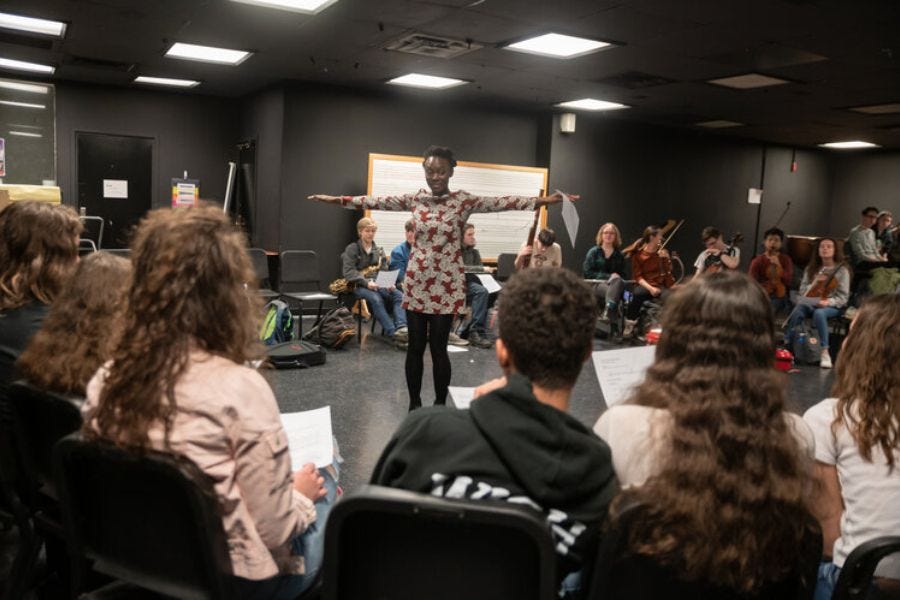
Lisa Bielawa - Blueprints I - performances by Lisa Bielawa, Molly Morkoski, Sarah Carrier, Rebecca Fischer, Ashleé Miller, Michael Atkinson, Oriana Hawley, Gregory Purnhagen, and Alex Sopp (self-released)
Huihui Cheng - Huihui Cheng - performances by Youmi Kim, Silke Evers, Noa Frenkel, Ensemble Experimental, SWR Experimentalstudio, Detlef Heusinger, Claudia Chan, Ensemble Ubu, Ensemble Mosaik, and Neue Vocalsolisten (Wergo)
Seán Clancy - Name Pieces (self-released)
Du Yun & JACK Quartet - A Cockroach’s Tarantella (Modern Sky)
Nat Evans - Say Those Words for Me (Circuit Church)
Ellen Fullman & Theresa Wong - Harbors (Room40)
Eiko Ishibashi - Hyakki Yagyō (Black Truffle)
John Hollenbeck - Songs You Like a Lot (Flexatonic)
Nathalie Joachim with Kaufman Music Center Students - Transformation (Kaufman Music Center)
Jenny Lin - Teresa Teng on a Steinway (Steinway & Sons)
Anaïs Maviel - Bleu Blanc Black (self-released)
Davy Mooney and the Hope of Home Band - Live at National Sawdust (Sunnyside)
Ellen Reid - lumee’s dream variations - performances by Nadia Sirota, Rebecca Jo Loeb, Attacca Quartet members, Rob Moose, Bridget Kibbey, and Matt Smallcomb (Decca Gold)
Dan Rosenboom - Points on an Infinite Line (Orenda)
Edward Smaldone - Once and Again - performances by Tony Arnold, Tara Helen O’Connor, June Han, Susan Narucki, Charles Neidich, Morey Ritt, and others (New Focus)
Newly Announced
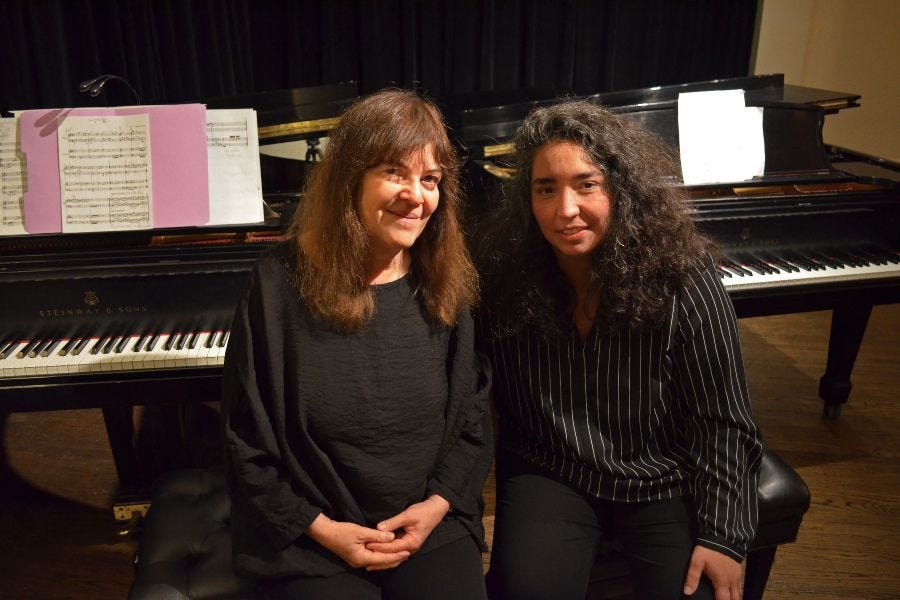
August 21
Bonnie Whiting - Perishable Structures - compositions by Bonnie Whiting, Frederic Rzewski, Vinko Globokar, Richard Logan-Greene, and Susan Parenti (New Focus)
August 28
David Serkin Ludwig - The Anchoress - Hyunah Yu, Mimi Stillman, PRISM Quartet, Pifaro The Renaissance Band (XAS Records)
September 4
Judith Hammann - Peaks (Black Truffle)
September 11
Eric Revis - Slipknots Through a Looking Glass (Pyroclastic)
September 18
Dan Weiss - Natural Selection (Pi Recordings)
October 2
Hemingway, Phillips & Moore – Slips (Ramboy)
Michael Moore Fragile Quartet – Cretan Dialogues (Ramboy)
The NDR Bigband with Michael Moore – Sanctuary (Ramboy)
Angelica Sanchez & Marilyn Crispell - How to Turn the Moon (Pyroclastic)
October 9
Travis LaPlante with Yarn/Wire - Inner Garden (New Amsterdam)
Matthew Levy - Sum of Its Parts - compositions by Emma O’Halloran and Jacob Walls (XAS Records)
J. Pavone String Ensemble - Lost and Found (Astral Spirits)
October 16
Nate Wooley - Seven Storey Mountain VI (Pyroclastic)
October 23
Luke Stewart - Exposure Quartet (Astral Spirits)
October 30
Junk Magic (Craig Taborn) - Compass Confusion (Pyroclastic)
Coming Soon
Improvising bassist, composer, and bandleader Gregg August, who pursues his art in the concert hall and the jazz club, talks his ambitious, timely new album, Dialogues in Race, Volume One, and how he has prepared for its arrival and reception.


